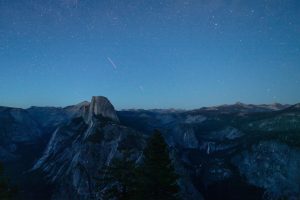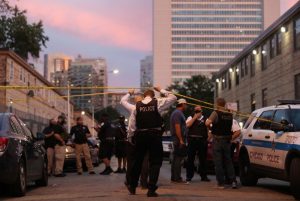Elizabeth Hoover, who has taught at Brown and Berkeley, insists that she made an honest mistake. Her critics say she has been lying for more than a decade.
leased her second statement, titled “Letter of Apology and Accountability.” In it, she writes, “I was first directly challenged in my Indigenous identity when I began my first assistant professor job.” The word “harm,” and its variants, makes thirteen appearances. Hoover never says that she lied, but she refers multiple times to “broken trust” and insists that she is deeply sorry. “I have put away my dance regalia, ribbons skirts, moccasins, and Native jewelry,” she writes. “I’ve begun to give away some of these things to people who will wear them better.”
“Excuse me, can I ask how you guys come up with such believable dialogue?”
Cartoon by Will McPhail
Reading this second statement, Kathryn De Master thought back to a visit she and a colleague had made to Hoover’s house months before, to ask Hoover about her past. If De Master and others in the department were going to support Hoover, they needed to have a full accounting of the facts, and they needed to hear them from her. The three colleagues sat together on Hoover’s porch. De Master asked Hoover if there had ever been questions about her Native heritage before she arrived at Berkeley, and Hoover emphatically said no. (Hoover denies saying no.)
I first contacted Elizabeth Hoover in May, 2023, the day after she published her second statement. We met shortly afterward, in a coffee shop in Berkeley. Living in a college town, one meets more than one’s share of academic narcissists, but Hoover didn’t come across as that type. Her charm and intelligence were obvious. She spoke of the wreckage of her life with a dark, engaging humor.
I told Hoover that others remembered her speaking of a connection to a family named Brooks, and then to the Rivers and Two Rivers families. If she had never researched her family, as she claimed, where did these names come from?
“I’ve had one story, which is the story that my mother gave me,” Hoover insisted. “My mom’s grandma was Adelaide Rivers, and she was under the impression that it used to be Two Rivers and she shortened it.” The Two Rivers family does in fact exist, though Hoover has no connection to it. She denies mentioning the name Brooks to anyone.
I asked why she didn’t enlist the help of Katsi Cook—who, despite all the allegations, still loves Hoover—in order to find her people in Kahnawà:ke. She reiterated her point about not meeting the criteria for enrollment. “I know other people who have been rejected in this way,” she said. “There’s not an ethos of ‘Yes, please come home and reclaim.’ People, when I would reach out, were prickly towards me.” She added, “I should have put myself out there. I should have just sucked it up.”
At one point, Hoover suggested that she didn’t investigate things further because the great-grandmother she’d heard about was not inspiring. “When people are, like, ‘Oh, draw on the strength of your ancestors,’ mine weren’t,” she said, alluding to Adeline Rivers. “She cracked and killed herself and abandoned her kids. So I lived in the present. And I went with the people that took me in and taught me and accepted me and didn’t provide this kind of resistance.”
How does one square these statements with Hoover’s reference, in an e-mail about Kahnawà:ke, to “people who knew people i’m related to”? Or with what she allegedly told friends at Weston’s wedding? Does it seem plausible that Hoover, a budding anthropologist, would have arrived in Kahnawà:ke, come so close to finding answers about who she was, and then just walked away?
Some of Hoover’s friends and colleagues have come to distrust her over time. In 2019, Hoover co-edited a book of essays about food sovereignty with a scholar at the University of Kansas named Devon Mihesuah. In the book’s original biographical materials, Hoover listed herself as Mohawk and Mi’kmaq. But after another of the book’s contributors was accused of being a Pretendian, Hoover, without alerting Mihesuah, contacted the publisher and asked to have her tribal affiliations removed from this material. Mihesuah doesn’t understand why Hoover would do this unless she doubted the veracity of the affiliations. (Hoover says that including her affiliations alongside Mihesuah’s felt inappropriate given that, unlike Mihesuah, she wasn’t an enrolled citizen.)
That same year, Hoover published an article in the Review of International American Studies titled “ ‘Fires were lit inside them:’ The Pyropolitics of Water Protector Camps at Standing Rock.” When Jennifer Weston read it, she saw that language had been lifted, without attribution, from the slides that she had given Hoover years before. She confronted Hoover, who said it had been an innocent mistake and asked the journal to issue an erratum. Later, Weston said, Hoover sent her a long handwritten explanation for what had happened. The letter came wrapped in “some kind of greenery,” Weston told me. “I don’t know if she put cedar or something in there with it. I guess she was intending to communicate some sort of healing energy or whatever.”
When Weston eventually read both of Hoover’s statements of identity, she could not recognize the person described there. “As someone who has known Elizabeth for twenty years, both of her statements are fraught with misinformation and misrepresentation,” she told me. Weston refuses to believe that Hoover never researched her genealogy. “She did look,” Weston said.
Although Hoover has support from some professors, the leadership of her department has turned against her. When the current school year started, two of her three graduate students refused to work with her. One of them, a Native student, had put aside community work to study at Berkeley with Hoover’s encouragement. She has switched advisers. As Hoover’s own career demonstrates, mentorship is crucial to academic success.
“I’m not going to be driven out, because I still have usefulness,” Hoover told me. “I still did all that work. I did the research, I did all the learning, I did the teaching. And I’m not going to have all of that just cancelled and thrown away because people are upset about this.”
For a long time, Hoover continued to show up to every department meeting, even to parties and retreats where her presence wasn’t mandatory. Some of her former students and faculty friends began to dread running into her. Eventually, the chair of her department announced via e-mail that Hoover would stop attending these events; the department’s administration also quietly tried to make sure that Hoover no longer worked in Native communities, as she had promised in her statement of accountability. (Hoover says she has upheld her promise without any administrative intervention.)
Almost immediately, however, rumors circulated that Hoover was breaking that promise, taking part in cultural burns—the lighting of controlled fires to manage Native land—and posting photos of herself at these events on Facebook. Hoover denies that the burns are part of her scholarly work and says that she had been invited by the tribal chairperson who hosted the burns. (The tribal chairperson did not respond to a request for comment.)
One day last fall, the Native grad student who had paused her community work was feeling overwhelmed by the turmoil in her new department and went to a cultural burn up north. She wanted to be around people who weren’t embroiled in the drama surrounding Hoover, she told me. When she got to the burn, which was crowded, Hoover was there. The tribal chairperson acknowledged Hoover, announcing that she had given him a beaded medallion a year or two before. “And then she was at the campfires, laughing really loud, like how Native women usually laugh,” the grad student said. “It’s weird she laughs like that.” ♦




